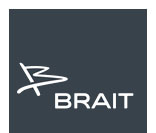Brait on the right path
John Gnodde‚ the chief executive of investment holdings group Brait‚ seems to be an investor with his ducks in a row.

This is because the group has a cash-flush balance sheet‚ some of its assets are generating strong cash-flows and Africa is beckoning as opportunities emerge in the consumer sector.
From the looks of it‚ it seems as though Brait is on the right path since it ditched its private equity model last year to become an investment group that mostly targets companies in sectors such as food and retail.
Currently‚ the group is sitting with cash and facilities worth R2.8bn to fund new investments and has no debt‚ Gnodde says.
Brait says cash and cash equivalents as of September were 4.8% of net asset value.
"We have no debt and we have cash and open facilities so we can write a cheque tomorrow if we have the right asset to invest in‚" Gnodde says.
Brait raised nearly R6bn last year via a rights issue, which it used to increase its stake in unlisted Premier Foods. This year it bought a share of UK-based frozen foods retailer Iceland Foods.
Its investment in Iceland Foods - costing £80m for a 19% stake - was its first foray into Europe and is in line with Brait's strategy to invest in businesses that can withstand cyclical economic periods.
It also raised R1.5bn from the issue of preference shares, which was used to pay debt.
Demand for the shares was so high that Brait received applications worth R2bn.
Gnodde says 85% of investors chose to take scrip instead of cash at the last dividend announcement in the year to March.
But a private equity analyst says Brait probably needs another large acquisition to grow its investments if it wants to achieve its target of 15% growth in net asset value each year for the next three years.
Gnodde‚ however‚ says Brait is not in a race and will take its time to investigate and eventually make further investments. He does not say where these investments will be made but acknowledges the potential in sub-Saharan Africa.
"This is a long-term business. We (the management team) are still young‚" he says. "But we have had a good start and we are giving ourselves ten years (to grow the business under the new model)‚" Gnodde says.
Last Wednesday Brait announced a 14% increase in normalised headline earnings per share to 240c for the six months to September. It declared a preference share cash dividend of 135.63c.
Brait's net asset value - which is the key performance measure it uses - rose by 11.8% (or 23% annualised) in the six months and this translated into a 25% compound annual growth rate since April last year.
Pepkor‚ a retailer that targets consumers in the lower-income segment‚ was the biggest contributor to growth in Brait's net asset value‚ says Adrian Cloete‚ equity analyst at Cadiz Asset Management.
Cloete singles out Pepkor as one of the businesses that has so far been "an exceptional" investment for Brait.
He says the nature of Brait's investment portfolio has enabled the group to create strong shareholder value in a tough global economic environment.
Gnodde says Pepkor will add more stores to the 118 it has in Africa over the next three years by expanding the number of outlets by an annualised 15%. He says, without giving figures, that Pepkor grew revenue by 17% for the year to June and generated strong cash-flows and margins.
Similarly‚ Premier Foods had performed ahead of target and increased market share in a highly competitive sector while Iceland Foods managed to overcome tough trading conditions in the UK even though its margins are under pressure from competition in the UK retail and supermarket sector.
Gnodde says he has no doubt that Brait's net asset value will grow through a "disciplined approach" to investing‚ maintaining management costs and implementing strategies to increase revenues in its underlying businesses.